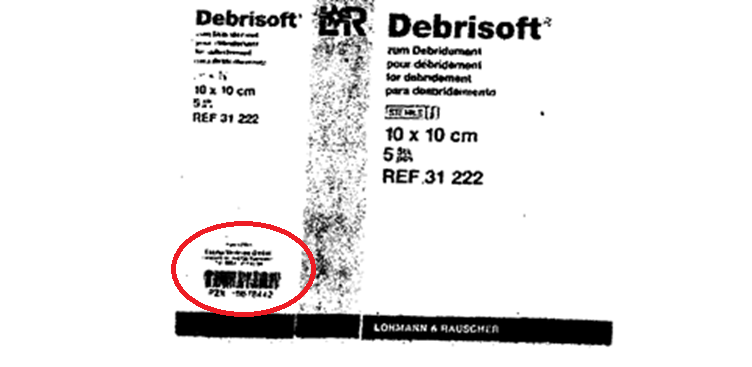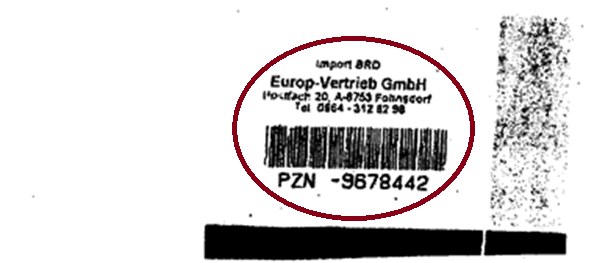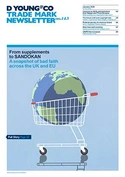Parallel imports: what constitutes repackaging?
What constitutes repackaging for the purposes of Bristol-Myers Squibb and Boehringer Ingelheim? To what extent is the application of a label to a pack ‘repackaging’? These are issues addressed by the Court of Justice of the European Union in Junek Europ-Vertrieb v Lohmann & Rauscher International, Case C-642/16. The decision offers some useful guidance for brand owners and parallel importers alike.
Lohmann & Rauscher International is a German company, manufacturing sanitary preparations for medical purposes and dressings and retailing them under the brand DEBRISOFT. It owns the European Union trade mark for DEBRISOFT for ‘sanitary preparations for medical purposes’, ‘plasters, materials for dressings’ and ‘dressings, medical’.
Junek Europ-Vertrieb is an Austrian company which parallel imports products sold under the brand DEBRISOFT from Austria to Germany. In doing so, Junek Europ-Vertrieb affixed on packaging a label featuring the following information: the company responsible for the importation, its address and telephone number, a barcode and a central pharmaceutical number. The label was applied neatly to an unprinted part of the box and did not conceal the mark of Lohmann & Rauscher International. This is shown below.


Art 15 Regulation 2017/1001 states that:
- "An EU trade mark shall not entitle the proprietor to prohibit its use in relation to goods which have been put on the market in the European Economic Area under that trade mark by the proprietor or with his consent.
- Paragraph 1 shall not apply where there exist legitimate reasons for the proprietor to oppose further commercialisation of the goods, especially where the condition of the goods is changed or impaired after they have been put on the market.”
In Bristol-Myers Squibb and Boehringer Ingelheim guidance was given on the application of the predecessor to this Article as follows (these are sometimes referred to as the BMS guidelines):
"The proprietor of a mark may legitimately oppose the further commercialisation of a pharmaceutical product imported from another Member State in its original internal and external packaging with an additional external label applied by the importer, unless:
- It is established that the use of the trade mark rights by the proprietor thereof to oppose the marketing of the relabelled products under that trademark would contribute to the artificial partitioning of the markets between Member States;
- It is shown that the repackaging cannot affect the original condition of the product inside the packaging;
- The new packaging states clearly who repackaged the product and the name of the manufacturer;
- The presentation of the repackaged product is not such as to be liable to damage the reputation of the trade mark and of its owner; thus, the packaging must not be defective, of poor quality, or untidy; and
- The importer gives notice to the trademark proprietor before the repackaged product is put on sale, and, on demand, supplies him with a specimen of the repackaged product."
Junek Europ-Vertrieb did not give Lohmann & Rauscher International prior notice of the importation of the product concerned and also had not supplied it with the modified packaging of the product with the contested label affixed. Lohmann & Rauscher International considered that the conduct of Junek Europ-Vertrieb was an infringement of the DEBRISOFT mark. It, therefore, lodged an action before the Landgericht Düsseldorf (Regional Court, Düsseldorf, Germany) alleging trade mark infringement and seeking, among other things, an injunction, delivery-up and destruction.
The Landgericht Düsseldorf found in favour of Lohmann & Rauscher International, holding that the importation was trade mark infringement. Junek Europ-Vertrieb appealed to the Oberlandesgericht Düsseldorf (Higher Regional Court, Düsseldorf, Germany), but the decision was upheld. It then, in turn, appealed to the Bundesgerichtshof (Federal Court of Justice, Germany), which referred the following (paraphrased) question to the Court of Justice of the European Union: ‘Does the BMS guidelines apply to medical devices?’
The Court held that the application of the BMS guidelines were not restricted to pharmaceutical products. It, however, drew a distinction between the case at hand and Bristol-Myers Squibb and Boehringer Ingelheim. In particular, it held:
“By contrast, in the case in the main proceedings, it must be observed, first, that the parallel importer has merely affixed an additional label to the unprinted part of the original packaging of the medical device in question, which, moreover, had not been opened. Second, the label is small in size and included, as the only information provided, the name, address and telephone number of the parallel importer, a barcode and a central pharmacological number which serves to organise the movement of the products with pharmacies.
Given that the packaging of the medical device concerned has not been modified and the original presentation of the packaging has not been affected other than by the attachment of a small label, which does not conceal the mark and which designates the parallel importer as responsible for placing it on the market by setting out his details, a barcode and a central pharmacological number, it cannot be held that the attachment of such a label constitutes repackaging within the meaning of the judgments of 23 April 2002, Boehringer Ingelheim and Others (C‑143/00, EU:C:2002:246), and of 26 April 2007, Boehringer Ingelheim and Others (C‑348/04, EU:C:2007:249).
Consequently, it cannot, in any event, be held that the attachment of such a label affects the specific purpose of the mark, which is to guarantee the origin of the product that it identifies.
In those circumstances, the attachment of an additional label, such as that at issue in the case in the main proceedings, by the parallel importer, namely by Junek Europ-Vertrieb, to the original packaging of the medical device, which has not been opened, is not a legitimate reason that justifies the proprietor of the mark, in this case Lohmann & Rauscher International, opposing the further commercialisation of the medical device concerned.”
It follows that the re-labelling described above is unlikely to be held to be trade mark infringement.
View full decision
Junek Europ-Vertrieb judgment, [2018] EUECJ C-642/16 (17 May 2018).
BAILII: [2018] EUECJ C-642/16